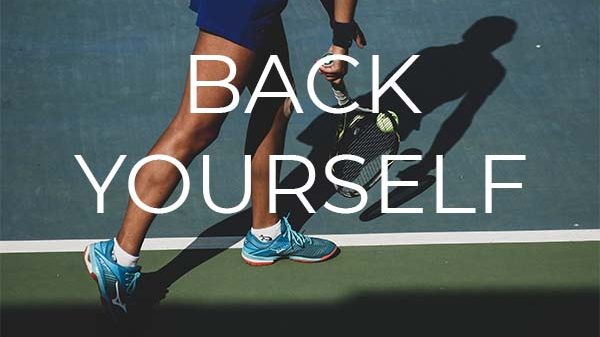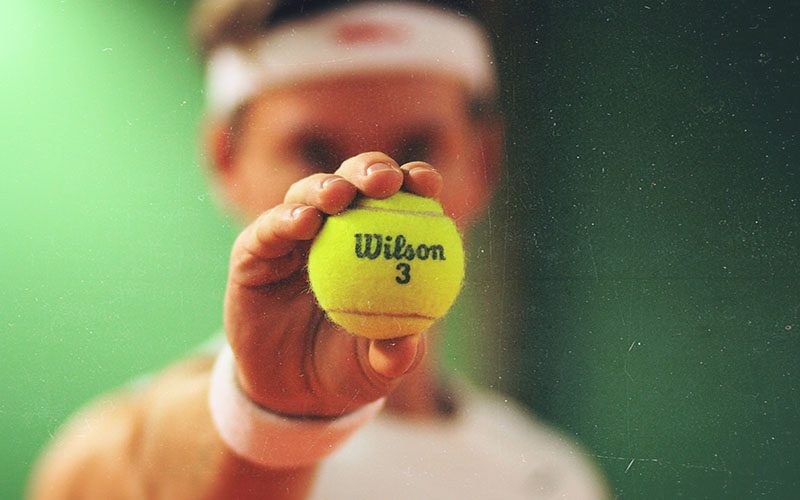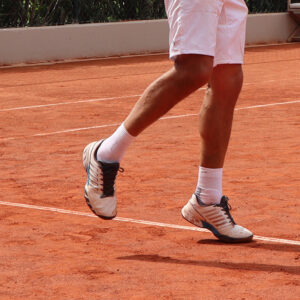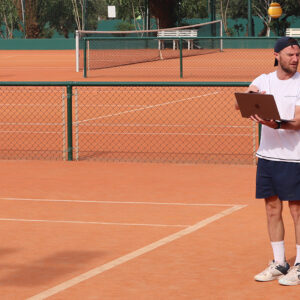What is being mentally tough in Tennis?
All sports have 3 main areas – technical, physical and mental. Tennis is no exception and the mental part of tennis is usually the deciding factor that tips the scales in a tennis match.
Being mentally tough in tennis is about not giving up and not letting your emotions get the better of you. This is what the likes of Novak Djokovic, Roger Federer and Rafael Nadal have done so well throughout their careers to enable their success. There is no reason as to why a club level tennis player could not apply similar principles to their own mental game and see a spike in results and attitude during tennis matches.
The mental or psychological side of tennis is severely overlooked both from players as well as spectators looking in from the outside and is very rarely talked about (especially at club level tennis). Developing what goes on inside our heads during tennis includes aspects of how you can stay on top of things within your control, using momentum when both winning & losing, and developing psychological habits to win matches.
Here at Active Away we look at the many factors and tactics that go into the mental side of tennis on our Tennis Holidays. Our doubles tactics not only make you a more mentally tough tennis player, but they also allow you to be constantly changing the picture of the game for your opponents which the professionals are able to do so well.
What do we mean by changing the picture of the game? Read on to find out more.

The Mental Battle in Club Tennis
Despite what you might think, a lot of the mental battles which top level tennis players face are similar to those which a club level players may have to overcome. The difference between club level mentality and professional mentality is that at club level, players don’t have a basic grasp on ‘controlling the controllables’.
Control the Controllables is a fantastic, must listen to Tennis Podcast for an avid player! We love this phrase here at Active Away and here is why…
A huge mental battle for club level players is facing up against whats on the other side of the net but this can’t be controlled and any negativity towards it is a loss for time which could be spent on our personal mental game. This allowance of letting something we can’t control take over our thoughts can ultimately cost you the game and very often does. Other components that may affect a club level players mentality is whether they are playing well or not. We talk a lot on our tennis holidays about not letting the previous point dictate the point you’re about to play and having a routine which allows you to prepare for the next point.
Timothy Gallwey (Author & Tennis Coach) wrote ‘The Inner Game of Tennis’ and has been instructing tennis for many years in a way that can alter both his students’ performances on the court and their lives off it. This approach to tennis and life experience is something which we deem to go hand in hand to becoming mentally tough. Gallwey’s approach is based on the idea of the “Inner Game” that participants engage in with themselves.


How injury can affect your mental state and confidence
For the average tennis player, tennis can be a major boost for their self esteem, they gain enjoyment and self satisfaction in achieving their set target goals and mastering new skills. They can use their sport as a constructive way to cope with stress in their everyday life as well as improving their mindset off the court. However, the love for the sport and confidence in ones self can quickly be taken away when our physical health is not up to scratch with our mental side.
Developing a tennis injury is one of the most common threats that tennis players encounter during the season. We frequently take part in competitions despite ‘having a niggle’ or carrying a larger injury, ignoring the pain and pushing through the pain barrier in order to achieve goals, often taking a tole on our bodies and mental strength during and post match. Playing on an injury can lead us to not go for certain shots and become less confident in our game overtime not allowing us to be mentally tough.
Not only does injury affect your current mental state but it can affect your mental state after you have recovered from an injury. A lot of players often worry when they get back on court after an injury about re-injuring themselves, this can have an affect on mental toughness but there are a few ways to combat this.
Being mentally tough signifies knowing your boundaries and putting the work in off the court so that we are physically and mentally prepared to play. Although most tennis players will continue to play when injured, it is not recommended unless you feel like your health is improving each time you play. Being okay with not moving fast enough or playing your best tennis when your body is fatigued is a great way of dealing with pressure in tennis and staying mentally tough.
Check out our Tennis Injuries Blogs here for more information on dealing with injuries.
How we can overcome mental battles at club level
Overcoming mental battles at club level can be difficult as sometimes we forget that tennis is our time to have some fun and let go of any personal stresses. Being mentally tough on the tennis court can mean allowing ourselves to come out and enjoy playing the sport we love whilst socialising with like minded individuals (one of our core values at Active Away). The main form of being mentally tough in tennis comes from understanding what we can and can’t control.
What can we control?
Attitude
Coming onto court with the right attitude is everything. If you go into a match with a positive attitude, you’re already halfway to winning. Here are our top tips for having the right attitude:
– Believe in yourself and never give up. This is probably the most important thing. Unlike other sports where there is a timer counting down, you can always come back from behind to win at any point during a tennis match. If you don’t believe that you can win, then you probably won’t.
– Stay focused. It’s easy to get distracted when you’re playing tennis, but it’s important to stay focused on the task at hand. Something as simple as knowing the score is something we can all control and shows you are concentrating, when we don’t know the score, it tends to be because we are losing and our attitude has changed.
Shot selection / tactics
Tactics are not just for professional tennis players and can be as simple as hitting to our opponents weaknesses.
– Using a warm up effectively can show you what your opponent’s strengths and weaknesses are. This way, you can be prepared for anything they throw at you.
– My personal favourite phrase, Change The Picture of the Game for your opponents. Try different formations, positioning, and shots for example; controlling the net with your partner or becoming “walls” at the baseline meaning to not give any easy points to your opponent from unforced errors.
– Practice makes perfect. When practicing or playing with friends, try new tactics which you can rely on in a match so that you are able to deal with different styles of tennis players. If you don’t feel confident in what you are trying to do, it is usually because you feel uncomfortable doing it. Tennis teaches us to try new things on & off the court and we are always playing a different type of shot from a different space on the court, one of the beauties of the game we play.
Routine
Our coaching program includes details on having your own routine. You have 25 seconds in- between each point so use them wisely!
– Use your rest time efficiently. Take this time to reflect on the last point, talk to your partner, and reset for the next point. It is especially important to communicate with your partner in doubles and can be a brilliant technique to stop you being negative in your own head as you need to motivate and help each other in order to win.
– Have a routine! Whether you are a Novak Djokovic who bounces the ball 1000 times before he serves (slight exaggeration) or you don’t like to mess around and only need one ball bounce, find out what works for you and implement this into every point before it starts. When I play competitively, I bounce the ball once on a first serve & twice on a second serve. When returning I am always in the same ready position, this consistency helps us be ready for each point.
What is out of our control?
The wind
The wind is a factor that affects most club level tennis players, especially in the Autumn / Winter period and it’s so frustrating when we feel like we can”t play our best tennis due to weather conditions.
– The key with dealing against wind is to not expect to play our best tennis. By doing so, we can make the proper adjustments to being mentally tough in any condition and actually using it to find a way to come out on top.
– Be consistent! We can’t control what the wind will do the ball we hit but we are able to control our shot selection. By hitting closer to the center of the court, we are giving ourselves a bigger margin for error. A great tip for when the wind is blowing against us would be to play a drop shot which is more effective than playing it with the wind on our side. Or, how about using the wind to hit a better angle and push our opponents off the court?
How we are playing
We love using the terminology that most of the time we play at our average level (70% of the time) and 20% of the time we play below average from not practising as much or just having a bad day. The final 10% is where we play our best tennis, we feel uber amounts of confidence and as if we can’t miss a ball on that given day. This 10% is the best feeling in the world which is why when we don’t perform to this level, we begin to have self doubt.
– Knowing this terminology (the % may vary for different people) is a form of being mentally tough in tennis and is a genuine mindset to enjoying your tennis even if you are having a bad day. Being able to win when you have a bad day is just as big of a victory as when you play your best tennis as in both scenarios, the battle of mental toughness has been overcome. Check out our blog on How To Win More Tennis Matches for more info on sending your win to loss ratio soaring.
Our opponents
When it comes to people you play against and especially people who you may not get along with, it can be a lot harder to overcome the mental battle. This is a part of tennis which when the match has started, we no longer have control of and the way we deal with situations can affect the outcome as well as our emotions during the match.
– Staying calm and using rest time effectively allows you to have a level head when playing. At every level of tennis, we tend to rush when we are agitated or losing. The best match players are able to use their routine and time effectively to stay level headed and come back from the brink of defeat through will power and not worrying about what is happening on the other side of the net.
-
Change the picture
-
Compete hard
-
Never give up
-
Chase every ball
-
Talk yourself in
-
Have acceptance
-
Commentate
-
Blame anyone/anything else
-
Define yourself by 1 result
-
Say "I shouldn't lose to them"

Conclusion
Essentially, being mentally tough in tennis is all about controlling the things in our grasp on a given day. By “changing the picture” we are able to control our mindset. Simply put don’t “talk yourself out.” “Talk yourself in.”
Using momentum when both winning & losing, and developing psychological habits to win matches will allow you to be a tough cookie to beat on a tennis court. Think about being the ultimate tennis competitor.












